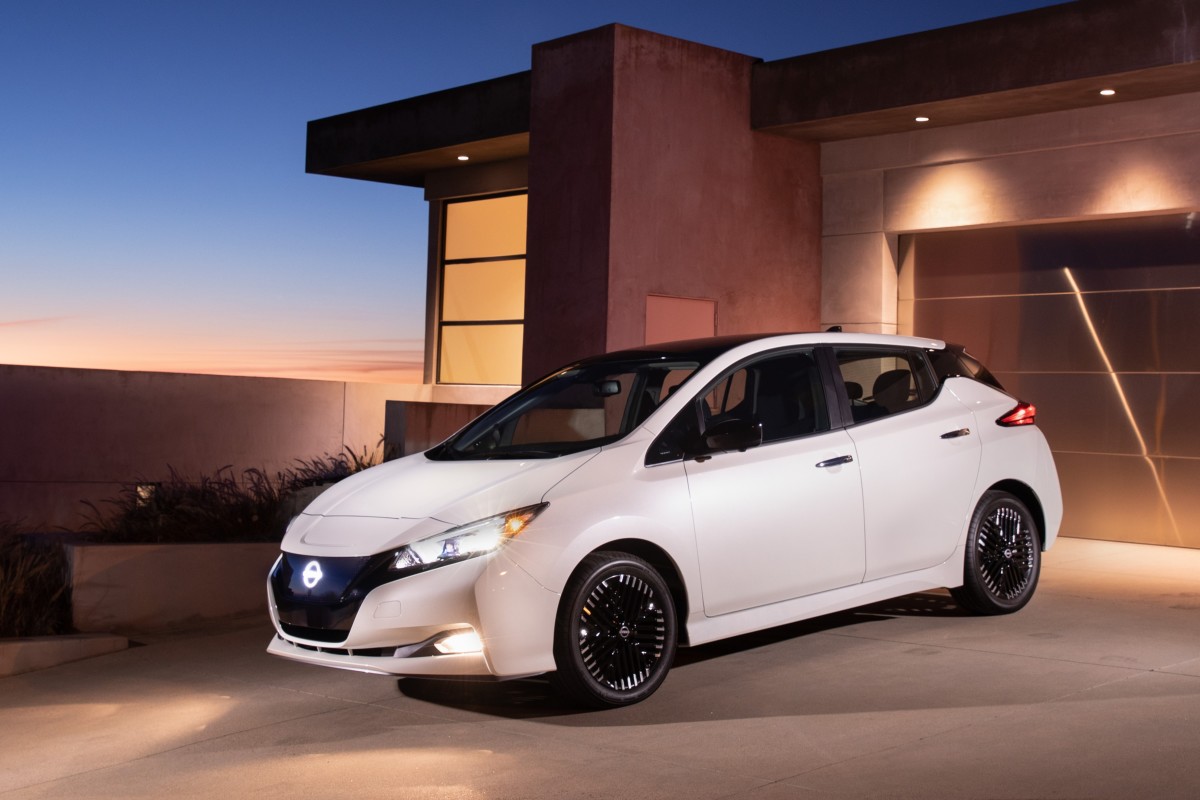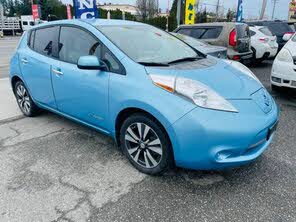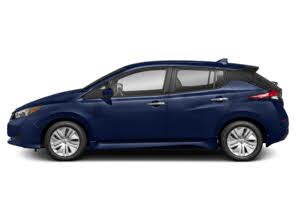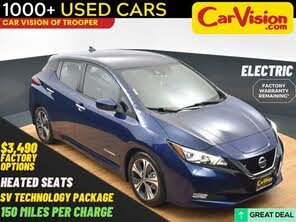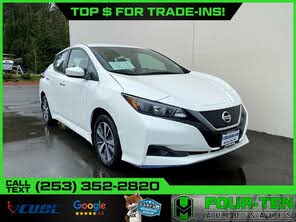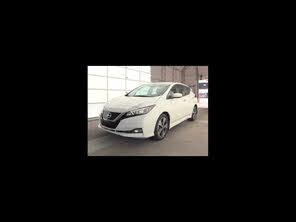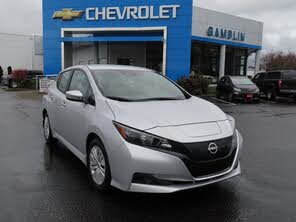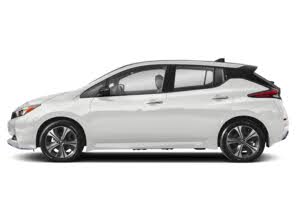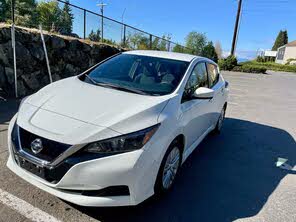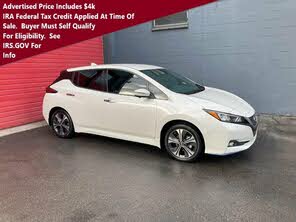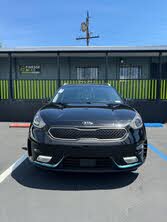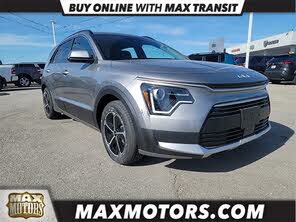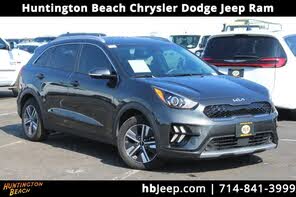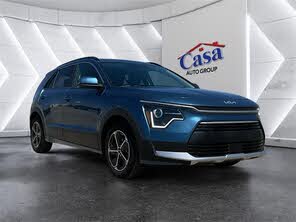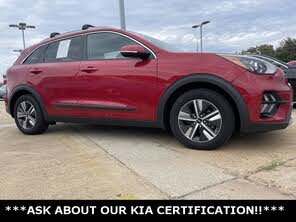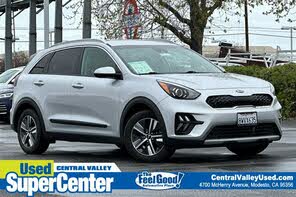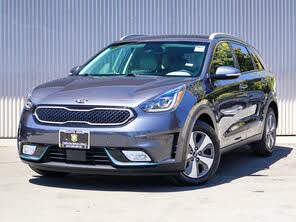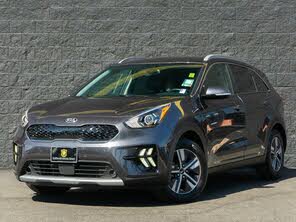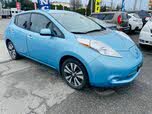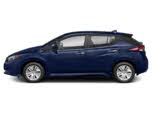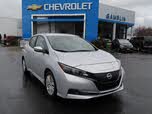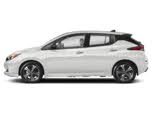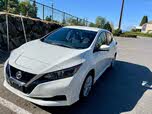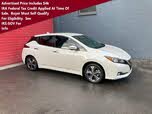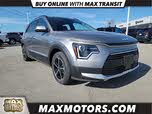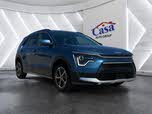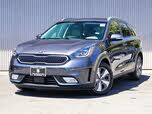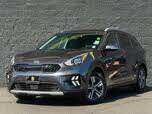Nissan LEAF vs Kia Niro Hybrid Plug-In
2020 Nissan LEAF for Sale
Shop Now2023 Kia Niro Hybrid Plug-In for Sale
Shop NowOverview | |
MSRP$31,600 | MSRP$33,840 |
Average price$13,388 | Average price$23,927 |
Listings3498 | Listings908 |
Ratings & Reviews | |
User Reviews | User Reviews |
Expert reviews6.8 out of 10 | Expert reviews7.2 out of 10 |
Pros
| Pros
|
Reviews SummaryThis is the car I wish Nissan made 10 years ago, when the first-generation Leaf almost stranded me on my way to work. Batteries have improved so much since 2010, they've made those early cars practically worthless on the used market. Case in point: with the second-generation Leaf, Nissan has added a new Plus model that claims up to 226 miles per charge, offers quicker acceleration, and includes more technology for every Leaf trim. It's enough to make the Leaf feel like a real car. | |
Reviews SummaryThe Kia Niro gets redesigned for 2023 model year, but keeps its trifecta of hybrid, plug-in hybrid, and all-electric powertrains. With the demise of its Hyundai Ioniq (not to be confused with the Ioniq 5) cousin, the Niro is now the only vehicle sold in the United States with those three powertrain options, ranging from a traditional hybrid to a fully electric vehicle. The second-generation 2023 Kia Niro PHEV plug-in hybrid gets the same updates as its Kia Niro Hybrid and Niro EV siblings (which we’ll cover in separate reviews), including dramatic new styling and a revamped interior, plus more power and electric range than the previous-generation Niro PHEV, which dated back to the 2018 model year. The plug-in hybrid market has shifted a bit since that first-generation Niro PHEV was launched. That version was considered significant because it wasn’t derived from a non-electrified model, but that no longer seems to be a priority for automakers or customers. Aside from the Toyota Prius Prime, most mainstream plug-in hybrids are now variants of existing crossovers, such as the Ford Escape PHEV, Hyundai Tucson Plug-In Hybrid, Mitsubishi Outlander Plug-In Hybrid, and Toyota RAV4 Prime—as well as Kia’s own Sportage PHEV. So the question for the 2023 Niro PHEV is, with plug-in hybrid versions of familiar crossover models now available, does a dedicated design still matter? | |
No video found | |
Popular Features & Specs | |
Engine147 hp Electric | Engine |
Drive TrainFWD | Drive Train |
Seating Capacity5 | Seating Capacity5 |
EV Battery Capacity40 kWh | EV Battery Capacity11.1 kWh |
MPG City123 | MPG City |
MPG Highway99 | MPG Highway |
Battery Charge Time (120V) | Battery Charge Time (120V)8.75 hours |
Battery Charge Time (240V)8 hours | Battery Charge Time (240V)2.25 hours |
Engine | |
Engine Name147 hp Electric | Engine Name1.6L 180 hp I4 Hybrid |
Torque | Torque195 lb-ft @ 4000 rpm |
Horsepower | Horsepower180 hp @ 5700 rpm |
Battery Charge Time (120V) | Battery Charge Time (120V)8.75 hours |
Battery Charge Time (240V)8 hours | Battery Charge Time (240V)2.25 hours |
DrivetrainFWD | DrivetrainFWD |
Fuel Economy | |
EV Battery Capacity40 kWh | EV Battery Capacity11.1 kWh |
MPG City123 | MPG City |
MPG Highway99 | MPG Highway |
Interior | |
Seating Capacity5 | Seating Capacity5 |
Key Features | |
Navigation System | Navigation SystemStandard |
Safety | |
Front Crash Overall4 | Front Crash Overall |
Side Crash Overall5 | Side Crash Overall |
Dimensions & Capacity | |
Cargo Space23.6 cu ft | Cargo Space19.4 cu ft |
Curb Weight3538 lbs | Curb Weight3336 lbs |
Height61.4 in | Height60.8 in |
Length176.4 in | Length174.0 in |
Width70.5 in | Width71.8 in |
Wheelbase106.3 in | Wheelbase107.1 in |
Maximum Payload1220 lbs | Maximum Payload1161 lbs |
Number of doors4 | Number of doors4 |
2020 Nissan LEAF for Sale
Shop Now2023 Kia Niro Hybrid Plug-In for Sale
Shop NowOverview | ||
MSRP | $31,600 | $33,840 |
Average price | $13,388 | $23,927 |
Listings | ||
Ratings & Reviews | ||
User reviews | 4.0 | 4.5 |
Expert reviews | 6.8 out of 10Read full review | 7.2 out of 10Read full review |
Pros & cons | Pros
| Pros
|
Summary | This is the car I wish Nissan made 10 years ago, when the first-generation Leaf almost stranded me on my way to work. Batteries have improved so much since 2010, they've made those early cars practically worthless on the used market. Case in point: with the second-generation Leaf, Nissan has added a new Plus model that claims up to 226 miles per charge, offers quicker acceleration, and includes more technology for every Leaf trim. It's enough to make the Leaf feel like a real car. | The Kia Niro gets redesigned for 2023 model year, but keeps its trifecta of hybrid, plug-in hybrid, and all-electric powertrains. With the demise of its Hyundai Ioniq (not to be confused with the Ioniq 5) cousin, the Niro is now the only vehicle sold in the United States with those three powertrain options, ranging from a traditional hybrid to a fully electric vehicle. The second-generation 2023 Kia Niro PHEV plug-in hybrid gets the same updates as its Kia Niro Hybrid and Niro EV siblings (which we’ll cover in separate reviews), including dramatic new styling and a revamped interior, plus more power and electric range than the previous-generation Niro PHEV, which dated back to the 2018 model year. The plug-in hybrid market has shifted a bit since that first-generation Niro PHEV was launched. That version was considered significant because it wasn’t derived from a non-electrified model, but that no longer seems to be a priority for automakers or customers. Aside from the Toyota Prius Prime, most mainstream plug-in hybrids are now variants of existing crossovers, such as the Ford Escape PHEV, Hyundai Tucson Plug-In Hybrid, Mitsubishi Outlander Plug-In Hybrid, and Toyota RAV4 Prime—as well as Kia’s own Sportage PHEV. So the question for the 2023 Niro PHEV is, with plug-in hybrid versions of familiar crossover models now available, does a dedicated design still matter? |
Video | No video found | |
Popular Features & Specs | ||
Engine | 147 hp Electric | |
Drive Train | FWD | |
Seating Capacity | 5 | 5 |
EV Battery Capacity | 40 kWh | 11.1 kWh |
MPG City | 123 | |
MPG Highway | 99 | |
Battery Charge Time (120V) | 8.75 hours | |
Battery Charge Time (240V) | 8 hours | 2.25 hours |
Engine | ||
Engine Name | 147 hp Electric | 1.6L 180 hp I4 Hybrid |
Torque | 195 lb-ft @ 4000 rpm | |
Horsepower | 180 hp @ 5700 rpm | |
Battery Charge Time (120V) | 8.75 hours | |
Battery Charge Time (240V) | 8 hours | 2.25 hours |
Drivetrain | FWD | FWD |
Fuel Economy | ||
EV Battery Capacity | 40 kWh | 11.1 kWh |
MPG City | 123 | |
MPG Highway | 99 | |
Interior | ||
Seating Capacity | 5 | 5 |
Key Features | ||
Navigation System | Standard | |
Safety | ||
Front Crash Overall | 4 | |
Side Crash Overall | 5 | |
Dimensions & Capacity | ||
Cargo Space | 23.6 cu ft | 19.4 cu ft |
Curb Weight | 3538 lbs | 3336 lbs |
Height | 61.4 in | 60.8 in |
Length | 176.4 in | 174.0 in |
Width | 70.5 in | 71.8 in |
Wheelbase | 106.3 in | 107.1 in |
Maximum Payload | 1220 lbs | 1161 lbs |
Number of doors | 4 | 4 |

By: CarGurus + AI
This car comparison has been created with using generative AI. It is based entirely on CarGurus expert review content, ratings and data, and leverages our extensive library of hands-on product tests to create thousands of unique comparisons to help shoppers choose the right car.
